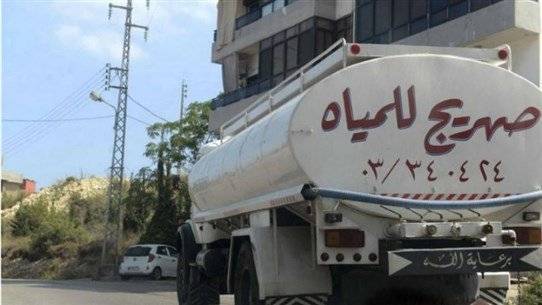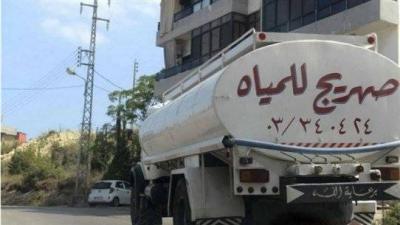They promised us a promising summer, but we never imagined that among those "honest promises," we would spend this summer without water, electricity, bread, or medicine. They promised us and they delivered. Our "beloved" expatriates will "show up," but will they find any water to bathe in? This is a question left for the failed state.
From the latest announcements of the esteemed Beirut and Mount Lebanon Water Establishment: "You are the support that raises us." They decided to celebrate Father’s Day at a time when the entire country suffers from extreme drought. A poor citizen rushed to respond to them: "This support needs 500,000 Lebanese pounds weekly for the cost of water tankers that are "scooping" in the neighborhood. And this is a crime." In some areas, the cost is 900,000 or eighty dollars depending on the distance between the source and the consumer. Yes, the Lebanese state, with all its components, is committing genocide against its people. Their hotline: 1713 is always busy. The hotline staff may have been celebrating Father’s Day yesterday, exhausted on all levels. Jean Gibran, the director of the Beirut and Mount Lebanon Water Establishment, does not answer. We call him more than once. His phone replies with a message: "sorry. I can't talk right now." No new updates from Jean Gibran, perhaps after what he said a week ago: "We were living rationing and we have reached a stage where rationing has become stricter and stricter. If we do not receive assistance, from diesel and others, we will stop distributing water. We have paid all our annual dues in less than six months, and we have no money left to cover the dues for the next six months. The increase we imposed on the water subscription is just a drop in the bucket, and to continue providing water, we need to raise it next year to at least 4 million and 800 thousand Lebanese pounds. The budget is income and expenses, and our revenues are a drop in the bucket."
The country is without electricity. We try to comprehend. Flour is missing, bread is scarce, and the future looks bleak. The Lebanese are in a “coma,” albeit reluctantly. Medicine is rare, and Lebanese people “grin and bear” their pain, seeking Turkish, Egyptian, or Syrian medicine. But, in the time of the "monkeypox" outbreak invading our homes and the return of COVID-19 amid the scorching summer and fungi, how can they go without water too? Are we heading towards the worst? They have exhausted us with that fearful equation, but what are they doing to confront it? How are they acting against it? Household tanks have run dry. Those who will enjoy features like: "Welcome to the view" will not find bathing water anytime soon. So, welcome to the hell of Lebanon.
We request Jean Gibran again. His line is still closed. The echoes, all the echoes, indicate that the crisis will escalate again and again... unless the donor organizations provide some assistance. UNICEF helps to provide drinking water to Lebanese citizens as well as Syrian refugees, and it has worked on covering the costs of repairing and maintaining 70 water pumping stations, which has helped maintain water supply for about two hours to approximately 458,000 people. UNICEF warned in a report released last July, nearly 11 months ago, of the danger of losing access to safe drinking water in Lebanon, which is unable to cope due to the inability to pay maintenance costs in foreign currency, coinciding with the collapse of the electricity network and the risks of rising fuel costs. UNICEF estimated that if the public water supply system collapses, the cost for families to obtain water would increase by 200 percent monthly due to resorting to other water suppliers. This is indeed where we have reached. According to UNICEF estimates, about 1.7 million people (as of last July) are receiving only 35 liters of water daily, which is a decrease of nearly 80 percent compared to the national average per capita water quota before 2020, which was 165 liters.
Here we are approaching July 2022. Our state has heard what we have heard but continued to watch! The official who cannot find solutions is of no use to himself or anyone else. According to the Water Authority itself, "water is life." So how can the state and its institutions cut off life from the Lebanese people, who are shouting, from end to end in Lebanon: "We want water!" and then demand payments and warnings that we are heading towards worse conditions?
Priority is given to hotels and resorts, and we are promised tourists who may temporarily rescue the country from its greatest crisis. But where will our "state" provide water for these individuals? It seems that tankers have started heading exclusively to large hotels and resorts in Lebanon rather than delivering a quantity of 1,000 liters to an apartment or two. One of the tanker owners named Johnny distributes water only to hotels and villas and says, "Prices have become in dollars only because diesel is priced in dollars and the cost of operating the tanker is in dollars too." His tanker carries 20,000 liters, which he sells for fifty US dollars. The water is filled from licensed water stations that operate on a meter and pay tax to the state. This suggests a harmonious relationship between tanker owners, water stations, and the competent state. In any case, the tanker owner states that requests decrease day by day because people, all people, are beginning to ration "God help the people."
Ghassan Baydoun, the former director-general of the Ministry of Energy and Water, always elaborates on how the electricity sector has reached its darkest depths. So what about the severe water drought and scarcity we've reached? He answers: "The direct and immediate cause, which does not require much explanation, is that most of our water sources are pumped by generators. We need electricity, which is not available. Therefore, what has brought us to our current situation is the mismanagement of water resources for the past 12 years, since institutions were created to manage the facility in an investment manner." He explains: "Public investment agencies for water require the establishment of supplies, networks, and proper management of natural resources to meet people's needs for water and cover production costs, and Article 221 states that the pricing should take the economic situation into account."
Nothing has been achieved. The crisis has intensified. Baydoun states: "While the world was moving towards decentralization, we moved towards centralization. In this regard, they worked to merge various institutions and sources of water into a weak management that did not adhere to the logic stipulated by the establishment of these institutions, which did not fill their vacancies nor secure their administrative, technical, and financial apparatus. Ministers - the Gibrans - resorted to companies and contractors, and Gebran Bassil seized all the aids coming to the sector and worked to direct their use to serve his regional and electoral interests. This caused certain regions to thrive at the expense of others, and all of this lacked a visionary perspective. They built failed, costly dams and appointed contractors under suspicion. We have not seen in over a decade a clean water project free of doubts and complaints. All of this makes us today declare aloud: how wonderful the electricity sector is compared to the water sector. Baydoun continues: "I remember how Bassil worked on removing Joseph Mikhaeel Nasir, the director-general of the Beirut and Mount Lebanon Water Establishment since 2002, from his duties and placed him at the disposal of the Minister of Foreign Affairs and Emigrants in 2018. He appointed Jean Gibran in his place. Gibran Bassil knew how to seize the will of the people in positions of authority as he wished."
What has brought us into this dark abyss is that we have coexisted with short-sighted administrations. And we continue to witness attempts at forming governments that kneel and negotiate. Each time we say to our state: What have you done to us? Someone emerges and says: The dollar crisis is not in our hands. "Our politicians," according to Ghassan Baydoun, "are shameless and ruthless. They have no mercy or shame.” He adds: “If we do not expand our use of solar energy to extract groundwater, finding solutions to the water crisis will be impossible.” He continues: "The National Disaster Management Authority was established in 2014. Do you know anything about it today?"
The clock approaches five o'clock. Jean Gibran is on the line. He has just finished a series of pressing meetings and is ready to respond. So what does he have to say? The engineer speaks frankly, without beating around the bush: "We are heading to a place that is not good at all." What does he mean precisely? He answers: "Electricity is declining, diesel is scarce, and we, as an institution, must now pay in fresh dollars, which is why we anticipate that water will be cut off." What does this mean? What does it mean for Lebanese people to live without water? He tries to explain: "35 percent of the water is distributed by gravity, whereas over 65 percent is distributed using electricity. This means that water will be cut off for at least seventy percent of the Lebanese."
We ask the water engineer: What have you done as an institution in the past couple of years, especially since international institutions, including UNICEF, warned of what we have reached a year ago? He responds: "We are a service institution. We did not create the problem. We are not responsible for the high cost of living and rising dollar rates. We are not the ones withholding diesel from the institution. Our employees receive less than 40 dollars (as a monthly salary), and our pain is the same as that of all Lebanese people. Pain has knocked on our door. We have sent dozens of letters to the relevant ministries, the Central Bank, and the government. We are a public institution without a say, and now, what is happening with us is that we have to manage the crisis, not continue with the strategies that we initiated. Our work has become on a daily basis."
What about converting water through solar energy? Hasn't the institution delayed in implementing this as a substitute for using fuel? Gibran answers: "We have prepared a study for all our sensitive areas and are waiting for assistance from donor parties to proceed with it."
In conclusion, pay attention to tap water as you would to a jewel. We are heading towards worse conditions. And the worst will be unbearable.




